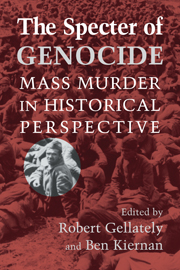Book contents
- Frontmatter
- Contents
- List of Contributors
- Acknowledgments
- INTRODUCTION
- PART I GENOCIDE AND MODERNITY
- 2 Twentieth-Century Genocides
- 3 The Modernity of Genocides
- 4 Seeking the Roots of Modern Genocide
- 5 Genocide and the Body Politic in the Time of Modernity
- PART II INDIGENOUS PEOPLES AND COLONIAL ISSUES
- PART III THE ERA OF THE TWO WORLD WARS
- PART IV GENOCIDE AND MASS MURDER SINCE 1945
- CONCLUSIONS
- Appendix: Convention on the Prevention and Punishment of the Crime of Genocide
- Index
3 - The Modernity of Genocides
War, Race, and Revolution in the Twentieth Century
Published online by Cambridge University Press: 05 June 2012
- Frontmatter
- Contents
- List of Contributors
- Acknowledgments
- INTRODUCTION
- PART I GENOCIDE AND MODERNITY
- 2 Twentieth-Century Genocides
- 3 The Modernity of Genocides
- 4 Seeking the Roots of Modern Genocide
- 5 Genocide and the Body Politic in the Time of Modernity
- PART II INDIGENOUS PEOPLES AND COLONIAL ISSUES
- PART III THE ERA OF THE TWO WORLD WARS
- PART IV GENOCIDE AND MASS MURDER SINCE 1945
- CONCLUSIONS
- Appendix: Convention on the Prevention and Punishment of the Crime of Genocide
- Index
Summary
The twentieth century was a period of the most intense and widespread violence. Two world wars and literally hundreds of smaller-scale armed conflicts pervade any accounting of this recent past. But the violence of the twentieth century is reflected not only in the number and intensity of wars. Woven through and wrapped around wars both large and small were radical and violent population politics – the categorization and then the internments, deportations, killings, and, ultimately, genocides of defined population groups.
For some contemporary observers, the violence of the first total war of the twentieth century and of the fascist regimes that soon followed seemed like a throwback to “medieval barbarism,” the breakdown of civilization constructed with such determined effort since the Enlightenment. More recently, some observers have explained the violent conflicts in the Balkans as the resurfacing of age-old hatreds, timeless tribal conflicts that had been only artificially suppressed in the communist era. But more insightful commentators, both in earlier decades and in the contemporary period, have seen in the violence of the twentieth century, both its vast wars and its devastations of defined population groups, the scourge of modernity, the nefarious underside of Western societies since the Enlightenment and the French Revolution. The breadth and depth of twentieth-century violence could be explained, it seemed, by modernity's defining features, the combined force of new technologies of warfare, new administrative techniques that enhanced state powers of surveillance, and new ideologies that made populations the choice objects of state policies and that categorized people along strict lines of nation and race.
- Type
- Chapter
- Information
- The Specter of GenocideMass Murder in Historical Perspective, pp. 53 - 74Publisher: Cambridge University PressPrint publication year: 2003
- 2
- Cited by



